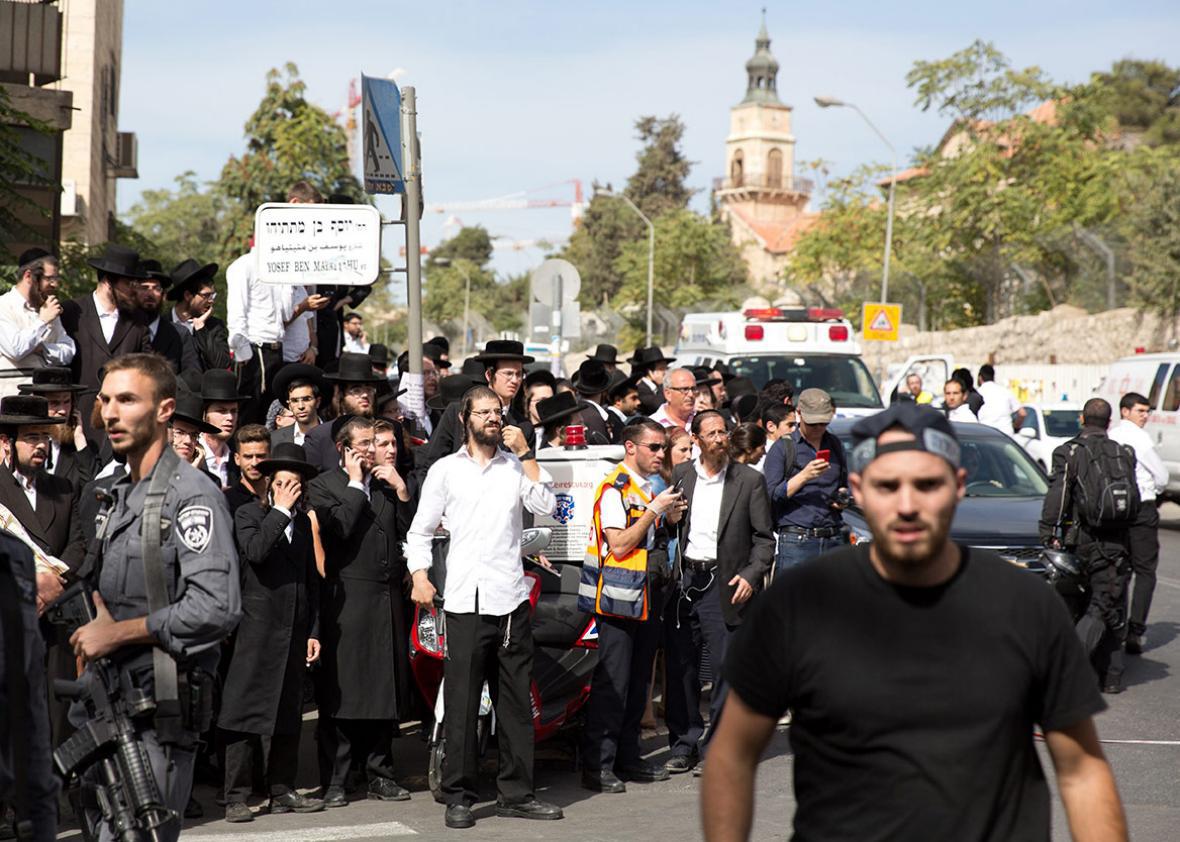The tragic upsurge in violence in Israel and Palestine over the past two months, which began with the August murder of a Palestinian family by Jewish settlers, followed by clashes on the Temple Mount and Noble Sanctuary, and over the past several days by a spate of horrific attacks by Palestinians against Israeli civilians, has been accompanied by the usual accusations and counter-accusations from politicians and pundits. It’s worth examining these claims for a moment to see what they tell us about the current moment, and why it’s likely to recur as long as the occupation continues.
In a speech in the Israeli Knesset, Prime Minister Benjamin Netanyahu accused Palestinian President Mahmoud Abbas of lying about Israeli plans on the Temple Mount. “If the situation deteriorates as a result of this incitement,” he said, “you will bear responsibility.”
According to an assessment last week by the Israel Defense Forces intelligence directorate, however, Abbas has been taking responsibility—and fighting terror. The IDF also reported that, despite Abbas’ speech at the United Nations late last month threatening to withdraw from agreements with Israel, the close security cooperation between Palestinian and Israeli security forces in the West Bank has continued.
A subsequent report by Israel’s internal security services, the Shin Bet, reached the same conclusion: that although some Palestinian officials had engaged in inflammatory rhetoric, Abbas was not encouraging terrorism “and is even instructing his security forces to prevent terror attacks as much as possible.” (It’s important to note here that the majority of violent attacks by Palestinians have taken place in areas where the Palestinian Authority has no presence.)
As for Netanyahu’s claim that Abbas was lying about the Temple Mount, it’s worth noting that Abbas is far from the only one unclear on Israel’s intentions. The Jerusalem Post reported, “But pressed on the matter, State Department officials echoed Abbas’ concerns, suggesting they believe Israel’s policy leaves open the possibility of change at the site.” This is probably because members of Netanyahu’s own Cabinet have been quite open about their goal of changing the status quo at the site.
Nonetheless, Netanyahu’s criticisms were echoed by a number of conservatives in the U.S., including Florida Sen. Marco Rubio, who issued a statement condemning Abbas’ alleged incitement and calling on the United States to unconditionally back Israel. “Israelis are under attack as they seek to do nothing more than go about their daily lives,” Rubio said. (A few days later, Politico reported that Republican megadonor Sheldon Adelson, a hardline supporter of Israel and opponent of Palestinian rights, was close to endorsing Rubio.)
The Wall Street Journal’s Bret Stephens went further, penning a feverish screed accusing Palestinians—as a people—of being “psychotic,” having a “blood fetish” and “blood lust.” (It’s worth noting that, if someone wrote something remotely similar about Jews, Stephens would be among the first to accuse him or her of anti-Semitism.)
Although nothing can excuse attacks on civilians, by any side, what all of these claims have in common is that they require a complete disregard for the way in which Palestinians are forced to live under Israeli occupation, now nearing its 50th year. It’s a daily reality of harassment and humiliation, constant threats of expulsion and home demolition, where Israeli settlers and troops commit regular acts of violence against Palestinian civilians with complete impunity and near-zero accountability, all of it justified under Israel’s increasingly threadbare assertions of “self-defense.”
In stark contrast to Netanyahu’s fear-mongering, Rubio’s pandering, and Stephens’ racism, however, IDF officials have recognized that Israeli violence provokes a Palestinian response. “Jewish violence toward Arabs is reaching levels we don’t recall seeing in the past,” an IDF official told Israeli columnist Nahum Barnea. “Israelis have ripped out hundreds of olive trees belonging to Arabs, ruined houses, smashed cars. The violence motivates counter-violence.”
Under Abbas, the Palestinian Authority has delivered years of security to Israelis, something acknowledged across the board by U.S. and Israeli officials. The understanding, affirmed in the Bush administration’s 2002 Road Map, was that if the Palestinian leadership worked to control terrorism and manage security, it would receive more independence, leading to full autonomy and statehood.
But it hasn’t worked out that way. Especially since Netanyahu took power in 2009, the Israeli government has taken advantage of the relatively calm situation (for Israelis) in the West Bank to dramatically increase its control of key areas, including Palestinian areas of Jerusalem and the Jordan Valley, in ways intentionally designed to foreclose the option of a viable Palestinian state. In return for security, the Palestinians have received more occupation and more settlements. And now that violence is on the upswing, they’ll probably receive more occupation and more settlements.
In an op-ed he co-authored, former Shin Bet chief Ami Ayalon wrote, “Israelis will have security when Palestinians have hope.” Recognizing the direct connection between despair and violence isn’t excusing that violence; it’s just common sense. But unfortunately, for reasons of ideology, fundraising, or bigotry, it’s common sense that too many politicians and pundits lack.
